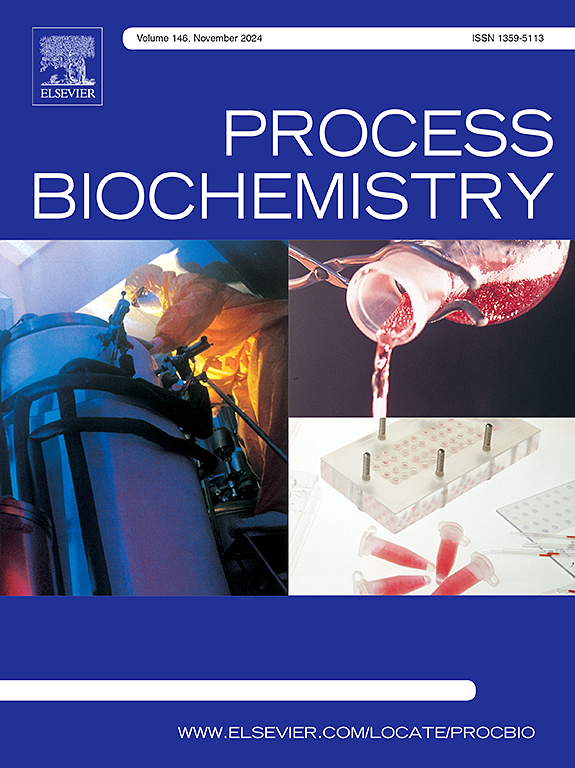释放CMP合成的潜力:合并酶设计,宿主基因组编辑和发酵优化策略
IF 3.7
3区 生物学
Q2 BIOCHEMISTRY & MOLECULAR BIOLOGY
引用次数: 0
摘要
胞苷-5′-单磷酸酯(Cytidine-5′- monophospate, CMP)及其衍生物在食品、医药和化妆品等领域发挥着重要作用。本研究采用核苷激酶(NK)和多磷酸激酶(PPK)的粗酶制剂协同合成CMP。通过合理的通道工程方法获得了一种变异的NK酶A220L/A236V/V237A/H252A,其活性比野生型提高了9.17倍。然而,当胞苷作为底物时,大量副产物的积累阻碍了反应效率,导致CMP产率始终低于80% %。通过敲除大肠杆菌宿主基因组中与胞苷代谢相关的cdd、rihA和rihC基因,CMP产量显著提高至95% %以上。随后,我们在5-L生物反应器中优化发酵工艺,进一步提高粗酶活性。优化后的粗酶偶联反应在20 h内成功生成291 mM CMP,产率高达97 %。本研究通过整合关键酶工程、宿主菌修饰和发酵工艺优化,显著提高了CMP的生产效率,为其工业化规模化生产奠定了坚实的基础。本文章由计算机程序翻译,如有差异,请以英文原文为准。
Unlocking the potential of CMP synthesis: Merging enzyme design, host genome editing, and fermentation optimization strategy
Cytidine-5′-monophosphate (CMP) and its derivatives play an important role in the fields of food, medicine and cosmetics. In this study, we used crude enzyme preparations of nucleoside kinase (NK) and polyphosphate kinase (PPK) to synthesize CMP in a synergistic reaction. A variant NK enzyme A220L/A236V/V237A/H252A was developed through a rational channel engineering approach, and its activity was increased by 9.17 times compared with the wild type. However, when cytidine was used as a substrate, the accumulation of a large amount of byproducts hindered the reaction efficiency, resulting in CMP yields that were always less than 80 %. By knocking out the cdd, rihA and rihC genes related to cytidine metabolism in the Escherichia coli host genome, the CMP yield was significantly increased to more than 95 %. Subsequently, we optimized the fermentation process in a 5-L bioreactor to further improve the crude enzyme activity. The optimized crude enzyme coupling reaction successfully generated 291 mM CMP within 20 h with a yield of up to 97 %. This study significantly improved the production efficiency of CMP by integrating key enzyme engineering, host bacteria modification and fermentation process optimization, laying a solid foundation for its industrial-scale production.
求助全文
通过发布文献求助,成功后即可免费获取论文全文。
去求助
来源期刊

Process Biochemistry
生物-工程:化工
CiteScore
8.30
自引率
4.50%
发文量
374
审稿时长
53 days
期刊介绍:
Process Biochemistry is an application-orientated research journal devoted to reporting advances with originality and novelty, in the science and technology of the processes involving bioactive molecules and living organisms. These processes concern the production of useful metabolites or materials, or the removal of toxic compounds using tools and methods of current biology and engineering. Its main areas of interest include novel bioprocesses and enabling technologies (such as nanobiotechnology, tissue engineering, directed evolution, metabolic engineering, systems biology, and synthetic biology) applicable in food (nutraceutical), healthcare (medical, pharmaceutical, cosmetic), energy (biofuels), environmental, and biorefinery industries and their underlying biological and engineering principles.
 求助内容:
求助内容: 应助结果提醒方式:
应助结果提醒方式:


